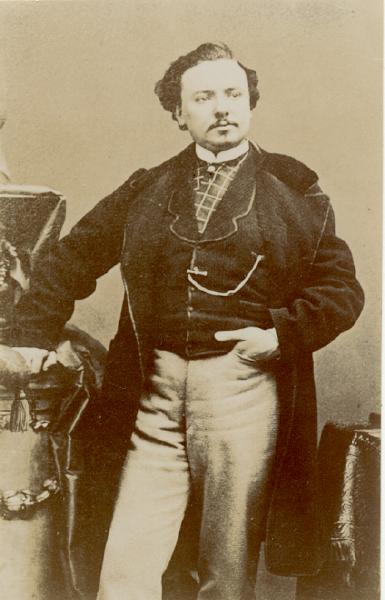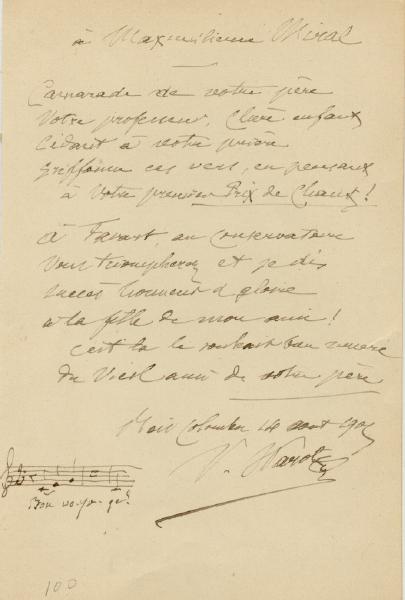Victor Warot
18 September 1834 Verviers – 29 March 1906 Bois-Colombe
Warot's father, another Victor Warot, was a versatile tenor and actor in Rennes, where Victor jr. (or Victor Alexandre)
grew up – and got his first voice lessons from his father, later from Giulio Alary in Paris. He briefly worked in a bank,
but appeared in concert already in Rennes, and in 1858 made his operatic debut at the Opéra-Comique. He was scheduled to
sing Raphael in Auber's La part du diable as his first role, and Auber was so impressed with the young tenor that he
wrote an additional solo for him. For some reason, though, Warot made his debut as Sergy in Les
Monténégrins by Armand Limnander, and sang also Georges Brown before appearing as Raphael as envisioned.
He stayed at the Opéra-Comique until the end of 1862. He sang Le faucheur in the world premiere of Le pardon de
Ploërmel, a huge success both for the work and for him personally; he was the world's first Beppe in Donizetti's
posthumous Rita; and he also premiered some lesser works (see repertory list below).
From 1863, he sang at the Paris Opéra. When he started there, he was still a lyrical tenor, and in La Juive,
he sang Léopold, or in La muette de Portici Alphonse. Critics, who usually raved about him throughout his career,
sniffed when first ventured into a more dramatic repertory in 1864, as Henri in Les vêpres siciliennes. In the world
premiere of L'Africaine, Warot sang the secondary character Don Alvar; but before long, he took over Vasco da Gama from
its creator Naudin, and had great success: he had established himself as a fort
ténor.
Besides his operatic appearances, though, he was perhaps even more important for the Paris concert business, singing lots of
sacred music, symphonies, cantatas... there was hardly any really important concert in Paris without his participation.
Talking about opera again,
he spent the 1866/67 season in Marseille, then returned to the Paris Opéra for another year. In 1868, he accepted a
contract at La Monnaie in Brussels, where he instantly became a big star. In 1869, he was in Marseille again, then he stayed at
La Monnaie until 1875. By now, he only sang heroic lead roles: Éléazar instead of Léopold, Masaniello
instead of Alphonse, Vasco da Gama, Arnold, Raoul, Manrico and so on.
From 1875 to 1878, he was back to Paris on the concert podium, and in the French provinces on the opera stage (Nantes, Angers,
Toulouse). Then it was Belgium's turn again, this time at the Royal French Opera in Antwerp, whose management collapsed
half-way through the 1878/79 season – Warot took over, now acting as both impresario and lead tenor, and both
successfully.
From 1879 to 1882, he was in France, singing in Paris in both opera (at the Gaîté-Lyrique, by now) and concert, as
well as in Nantes and Geneva. He ended his career in Antwerp (with excursions to Gent) from 1882 to 1885.
Repertory (still incomplete, probably)
WP = world premiere
Les Monténégrins (composer: Limnander, role: Sergy) – Paris, Opéra-Comique, 1 October 1858
La dame blanche (Georges Brown) – Paris, Opéra-Comique, 1858
La part du diable (composer: Auber, role: Raphael) – Paris, Opéra-Comique, 1858
Le pardon de Ploërmel (Le faucheur) – Paris, Opéra-Comique, 26 April 1859 (WP)
L'ambassadrice (composer: Auber, role: Bénédict) – Paris, Opéra-Comique, 1859
Le songe d'une nuit d'été (Lord Latimer) – Paris, Opéra-Comique, 1859
Don Gregorio (composer: Gabrielli, role: Luigi) – Paris, Opéra-Comique, 17 December 1859
Fra Diavolo (Fra Diavolo) – Paris, Opéra-Comique, 1860
Le petit chaperon rouge (composer: Boieldieu, role: Roger) – Paris, Opéra-Comique, 1860
Le pré aux clercs (de Mergy) – Paris, Opéra-Comique, 1860
Rita ou Le mari battu (Beppe) – Paris, Opéra-Comique, 7 May 1860 (WP)
Le docteur Mirobolan (composer: Gautier, role: Géralde) – Paris, Opéra-Comique, 28 August 1860 (WP)
Barkouf (composer: Offenbach, role: Saëb) – Paris, Opéra-Comique, 24 December 1860 (WP)
La fille du régiment (Tonio) – Paris, Opéra-Comique, 1861
Salvator Rosa (composer: Duprato, role: Antonio) – Paris, Opéra-Comique, 1861
La beauté du diable (composer: Alary, role: Max) – Paris, Opéra-Comique, 1861 (WP)
Le postillon de Lonjumeau (Chapelou) – Paris, Opéra-Comique, 1862
Giralda (composer: Adam, role: Don Manoël) – Paris, Opéra-Comique, 1862
Haydée (Loredan) – Paris, Opéra-Comique, 1862
Zémire et Azor (Azor) – Paris, Opéra-Comique, 1862
La mule de Pedro (composer: Massé, role: Tebaldo) – Paris, Opéra, 4 March 1863
Le comte Ory (Comte Ory) – Paris, Opéra, 1863
La Juive (Léopold) – Paris, Opéra, 1863
La muette de Portici (Alphonse) – Paris, Opéra, 1863
Les vêpres siciliennes (Henri) – Paris, Opéra, 1863
Moïse et Pharaon (Aménophis) – Paris, Opéra, 1863
Le docteur Magnus (composer: Ernest Boulanger, role: Daniel) – Paris, Opéra, 1864 (WP)
Le philtre (composer: Auber, role: Guillaume) – Paris, Opéra, 1864
Roland à Roncevaux (composer: Mermet, role: Un pâtre) – Paris, Opéra, 3 October 1864 (WP)
L'Africaine (Don Alvar) – Paris, Opéra, 28 April 1865 (WP)
L'Africaine (Vasco da Gama) – Paris, Opéra, 1865
Le dieu et la bayadère (composer: Auber, role: Inconnu) – Paris, Opéra, 1865
Don Carlos (Don Carlos) – Paris, Opéra, 1867
Don Giovanni (Don Ottavio) – Paris, Opéra, 1867
Armide (Renaud) – Paris, Opéra, 1868
Lucia di Lammermoor (Edgardo) – Brussels, Monnaie, 1868
Faust (Faust) – Marseille, Opéra, 1869
Les huguenots (Raoul) – Brussels, Monnaie, 1869 or 1870
Lohengrin (Lohengrin) – Brussels, Monnaie, 1870
La favorite (Fernand) – Brussels, Monnaie, 1870 or 1871
La muette de Portici (Masaniello) – Brussels, Monnaie, 1871
Elisabeth de Hongrie (composer: Beer, role: Georges) – Brussels, Monnaie, March 1871
Un ballo in maschera (Riccardo) – Brussels, Monnaie, 5 March 1872
Elijah (Obadiah) – Brussels, Monnaie, 3 April 1872
Der fliegende Holländer (Erik) – Brussels, Monnaie, 6 April 1872
Tannhäuser (Tannhäuser) – Brussels, Monnaie, 20 February 1873
Roméo et Juliette (Roméo) – Brussels, Monnaie, 1874
Charles VI (composer: Halévy, role: Dauphin) – Brussels, Monnaie, 1874
La reine de Chypre (Gérard de Coucy) – Brussels, Monnaie
Le prophète (Jean de Leyde) – Brussels, Monnaie
Il trovatore (Manrico) – Brussels, Monnaie
Polyeucte (Polyeucte) – Antwerp, Royal, 1878/79
Guido et Ginevra (composer: Halévy, role: Guido) – Paris, Gaîté-Lyrique, 1879
Pétrarque (composer: Duprat, role: Pétrarque) – Paris, Gaîté-Lyrique
La forza del destino (Don Alvaro) – Antwerp, Royal Français, 1882/83
Jérusalem (Gaston) – Antwerp, Royal Français, 1882/85
Le tribut de Zamora (composer: Gounod, role: Manoël) – Antwerp, Royal Français, 1882/85
Robert le diable (Robert) – Antwerp, Royal Français, 1882/85
Françoise de Rimini (composer: Thomas, role: Paolo) – Antwerp, Royal Français, 1883/84
Pedro de Zalemea (composer: Godard, role: Don Alvar) – Antwerp, Royal Français, 31 January 1884 (WP)
Néron (Néron) – Antwerp, Royal Français, 1884/85 (premiere in French)
Reference 1, reference 2
|

